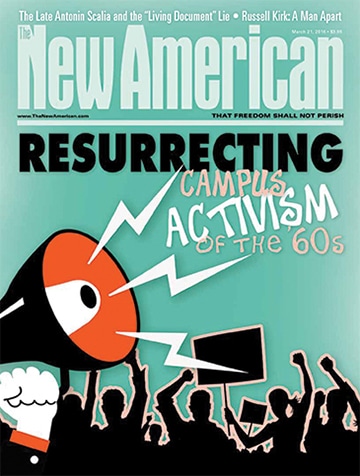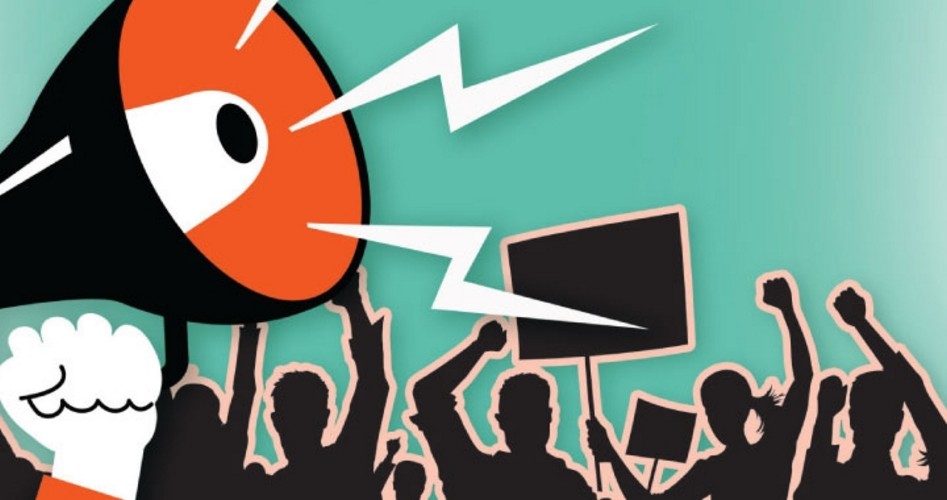Resurrecting Campus Activism of the ’60s
Ever since the 1960s, folk music and campus protests have gone together hand in glove. The dulcet harmonies and vapid lyrics of many ’60s folk tunes provided the perfect mood music for the simplistic tantrums that engulfed American universities during that turbulent decade. Take a nostalgic listen sometime to the cringe-worthy lyrics of such songs as “If I Had a Hammer” and “Big Yellow Taxi” to sample the rather callow spirit of the age. It was tempting to hope that the era of such preening lyrical fluff met its end when John Belushi unceremoniously smashed into a wall the folk singer’s guitar in the 1978 movie Animal House, a statement that seemed to punctuate the demise of folk rock the same way that Disco Demolition Night at Chicago’s Comiskey Park spelled the end of disco in 1979. And though popular music continues to evolve, not always for the better, the same hackneyed campus discontent continues to flare up from the embers of the self-indulgent sit-ins and hyperbolic demands of 1960s protest culture, as new generations of impressionable students arrive on campus to fuel the flames of social unrest.
Cold Missouri Waters: How Show Me State Radicals Opened the Floodgates
The flashpoint for this latest iteration of campus discord is the recent protests at the University of Missouri, an upheaval that has spilled over to campuses across the country. Formal protests broke out September 24, 2015, at a “Racism Lives Here” rally that sought to draw attention to a number of alleged racial incidents on campus that, according to protesters, were inadequately addressed by UM administrators. The incidents, spanning a period of five years, include anecdotal episodes and things that did not even occur on campus, such as student government president Payton Head’s claim that racial slurs were directed at him by unidentified individuals driving a pickup truck outside university property. Other notable incidents include two white students arrested for dropping cotton balls in front of the Black Culture Center in 2010. The students were charged with tampering in the second degree, a Class D felony upgraded because of a hate-crime classification. Further reports detail a drunken student using a racial slur and racially charged graffiti in a dorm room, dating from 2011. A critical escalation of campus tensions took place on October 24, 2015 when police were summoned to a dorm where an unidentified person allegedly smeared feces in the shape of a swastika on a bathroom wall.
Angry that UM system president Timothy Wolfe did not initiate wide-scale campus reforms to counter these episodes — cited as evidence of systemic racism — student protest organizer and activist Jonathan Butler undertook a much-publicized hunger strike to force Wolfe’s resignation. Shortly thereafter, during recruiting day on the UM campus in front of hundreds of prospective students, protesters interrupted the university tour to stage a “mock tour” where they read a list of racist incidents at the school and scattered cotton balls in front of the Black Culture Center (this time, no one was arrested or charged with a hate crime). The next day, primarily black players on the football team vowed not to practice or play until Wolfe resigned, even threatening to forfeit their upcoming game against Brigham Young University. Almost immediately, Wolfe resigned and the school’s chancellor announced his impending retirement.
JBS Member or ShopJBS.org Customer?
Sign in with your ShopJBS.org account username and password or use that login to subscribe.

 Subscribe Now
Subscribe Now
- 24 Issues Per Year
- Digital Edition Access
- Exclusive Subscriber Content
- Audio provided for all articles
- Unlimited access to past issues
- Cancel anytime.
- Renews automatically

 Subscribe Now
Subscribe Now
- 24 Issues Per Year
- Print edition delivery (USA)
*Available Outside USA - Digital Edition Access
- Exclusive Subscriber Content
- Audio provided for all articles
- Unlimited access to past issues
- Cancel anytime.
- Renews automatically


